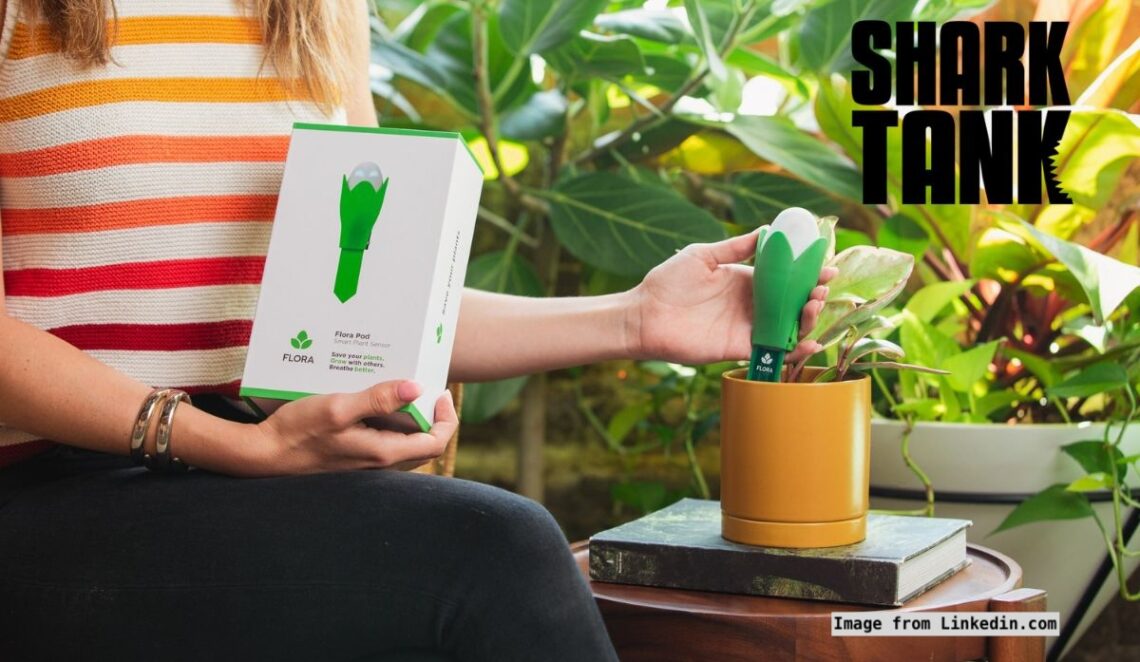
Flora Pod Plant Sensor: Shark Tank Home Gardening Tool with AI Technology
The Flora Pod Plant Sensor hit Shark Tank viewers on Season 15 Episode 14. The Flora Pod is a device designed to provide real-time data about the specific needs of indoor and outdoor plants, making sure that they can thrive independently of your green thumb. This is a very fascinating product because, unlike my wife, I do not have a green thumb, and I am likely to inadvertently kill a plant while believing I’m caring for it!
Flora Pod Plant Sensor – The Numbers:
- Amount and equity asked: $300,000 for 10% equity
- Amount and equity received: $300,000 for 15% equity + 5% advisory shares + $2 royalty
- Shark(s) in the deal: Lori Greiner
- Valuation of the deal: $2,000,000 (excluding the 5% advisory shares)
Table of Contents
Flora Pod Shark Tank Pitch
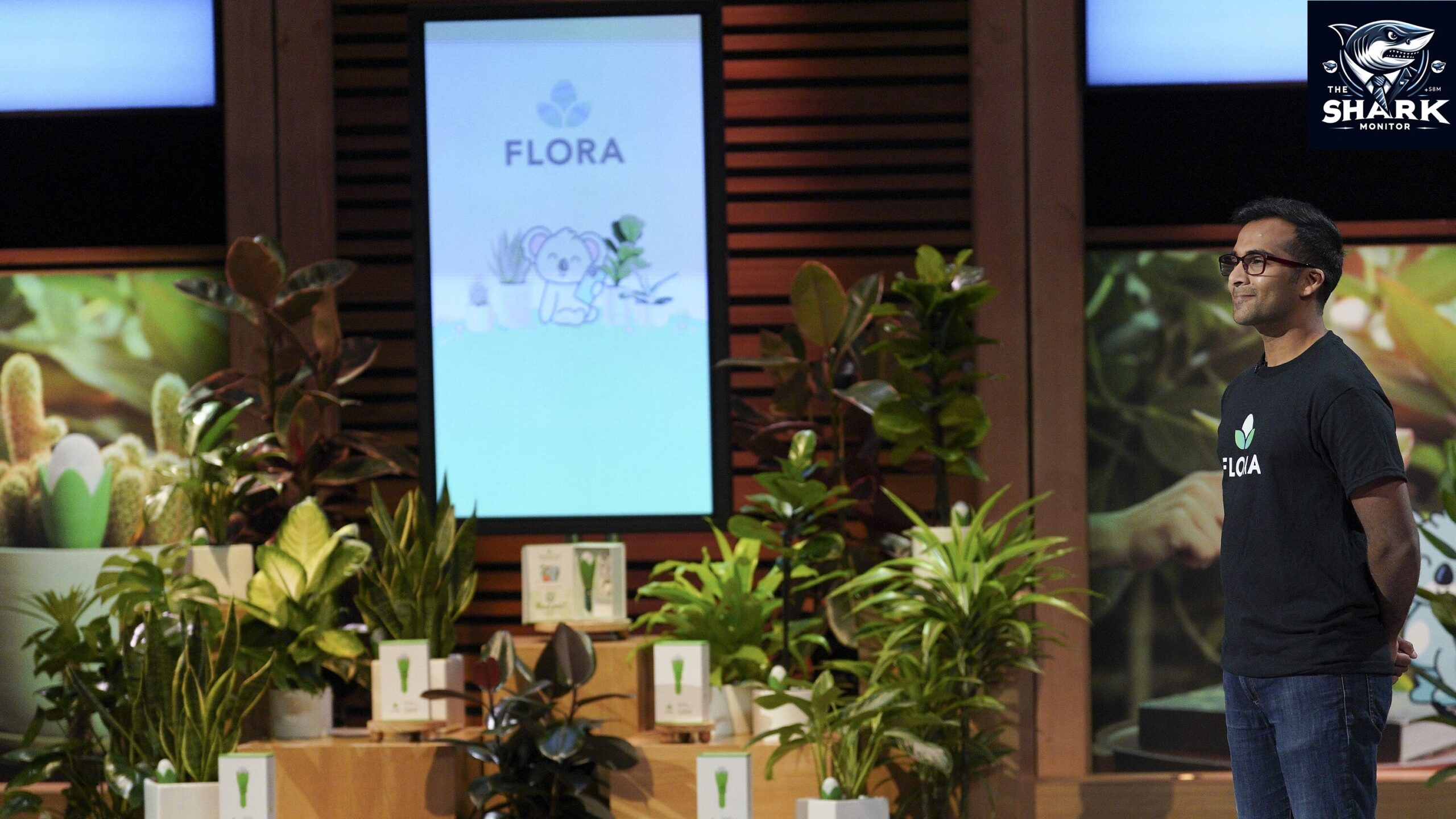
Aabesh De is a former Microsoft employee, that during COVID, ended up killing all the plants he touched. Yet, he saw an opportunity and acted upon it. After walking into the Tank, he confessed…
The last straw for me was when my dear my mother gave me her prized rose bush plant, that she’s been growing for years, and I ended up killing that thing in 8 short days. I had enough, so I invented the Flora Pod.
Aabesh De
Aabesh then demonstrated some functionalities of the Flora app, and how it can be used to help Chloe, a plant that definitely can use some help.
Flora Pod’s Sales and Costs
The Flora Pod costs $28 to make, it’ll go down to $14 with the next batch, and sells for $50. Kevin argues that for that price he can buy multiple Chloes. Aabesh addresses how the Flora Pod can be used across multiple plants, and how they custom tailor recommendations per each type of plant.
Sales-wise, the first year brought $192,000 in gross sales. The app subscriptions contributed to $144,000, and $50,000 came from the sensor. A subscription is $10/month, or $60/year, with 3,000 paying users, and 225,000 registered users. To date, the Flora Pod sits at $100,000 in sales, with $180,000 spent in marketing and customer acquisition. Overall, the Flora Pod is not profitable yet.
That said, Aabesh raised $670,000 from angel investors and family, for a $5M post money SAFE valuation, although they did an $8M post money SAFE already. Kevin addresses the current company valuation of $3M, which is justified by Aabesh addressing the value that the Sharks bring in.
Explanation: SAFE stands for “Simple Agreement for Future Equity.” It is a form of investment that’s used during early-stage rounds of financing. It’s an agreement between an investor and a company that provides the investor with the right to receive equity in the future, specifically when a priced round of financing happens.
Basically, SAFEs are short agreements that promise future equity in the company to investors in return for immediate investment while non-SAFE investments are based on the current company’s valuation and result in an immediate exchange of cash for equity shares.
Negotiation With the Sharks

Robert Harjavec and Mark Cuban mentioned how they don’t really have plants, they don’t understand them, and they are not the right partner. And for those reason, both were out.
Barb mentioned how she loves plants more than her husband, but she would never go for a subscription plan after buying it, so for that reason, she was out too.
Kevin O’Leary was very poetic in saying that he loved the presentation, but he doesn’t give a s**t about this (plant) space…and with that, he was out.
Lori Greiner mentioned how she would need $300,000 for 30%. Aabesh then comes up with a great counter. He kept $300,000 for 15% with 5% advisory shares, and $2 in royalties until Lori gets her money back.
You wanna know something? I think you are smart as hell, and I like to invest in people that are smart as hell…and you got a deal!
Lori Greiner
And with that, Lori became the investor in Aabesh’s Flora Pod’s business. The valuation of Flora Pod, excluding advisory shares, is $2,000,000.
Origins of The Flora Pod Plant Sensor
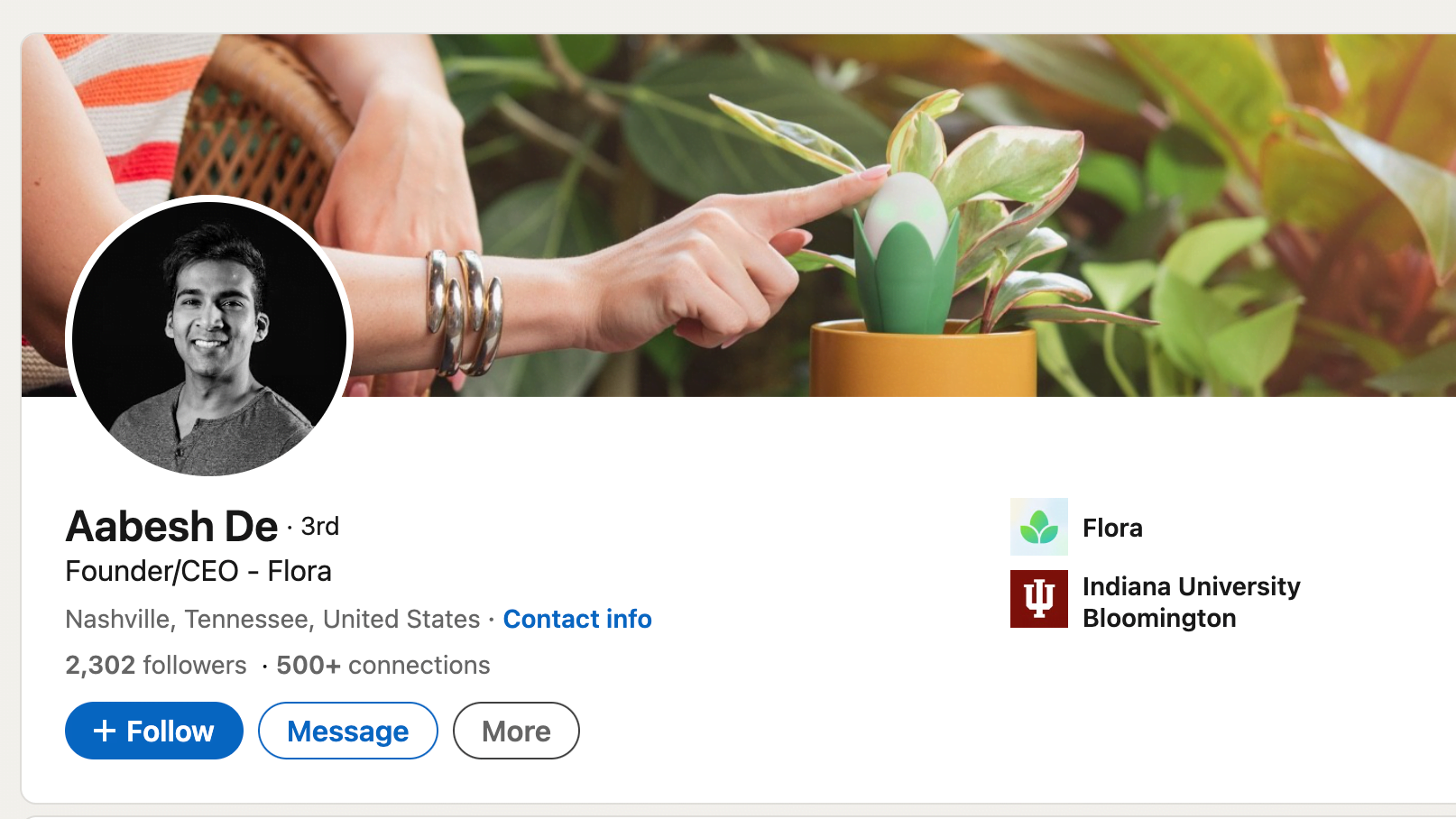
Aabesh De, a driven first-generation immigrant who loves to traverse the world, started Flora Pod out of his initial curiosity. The Flora Pod concept and the Flora iOS app were his solution to gardening despair.
Aabesh is a self-taught mobile developer, mainly focusing on Swift, directing his efforts towards the creation of purposeful, mission-based products for a large audience. His past positions include tech titans like Microsoft and Etsy. A firm believer in nature’s healing, his present ventures are about saving plants and battling the growing climate crisis by bridging the gap between nature and humanity.
Aabesh’s goal is to help even the most horticultural challenged individuals in keeping their plants alive with the novel device.
Kickstarter Campaign
The initial funding for the Flora Pod Plant Sensor came from a successful Kickstarter Campaign, where it raised $54,568. This campaign enabled the transition of the Flora Pod from concept to reality, promising to deliver detailed plant care guidance. With a single 2-hour charge lasting 3-4 months, the device offers versatility and sustainability.
It is equipped to handle multiple plants and is designed to be dirt proof and waterproof, for maximum durability. The sensor provides precise measurements for light, water, temperature, and humidity tailored to the specific needs of each plant. This function aligns with Flora’s wider mission to nurture the growth of 10 million plants via its app and hardware by 2025.
Flora Pod Design and Features
Flora Pod stands out thanks to a compact design and technological features aimed at simplifying plant care. It offers users guidance on plant health through a user-friendly app with a simple, and easy-to-follow interface.
Physical Build
The Flora Pod exhibits a pocket-sized, robust physical structure designed for easy placement in a plant’s soil. It integrates environmental sensors within a water-resistant casing, ensuring longevity and resilience in various indoor plant conditions.
Sensor Capabilities
This intelligent device includes sensors that measure moisture, light, humidity, and temperature. Each sensor is calibrated to provide accurate feedback tailored to specific plant species, enabling precise monitoring of a plant’s environmental needs.
How Does Flora Pod Work?
Flora Pod operates by collecting data from its sensors and processing it to give plant owners actionable insights. Users receive notifications via the Flora app, which details care instructions such as when to water or adjust the plant’s exposure to light. The app connects to the Flora Pod through wireless technology, forming a seamless system for plant maintenance.
How Much Does the Flora Pod Plant Sensor Cost?
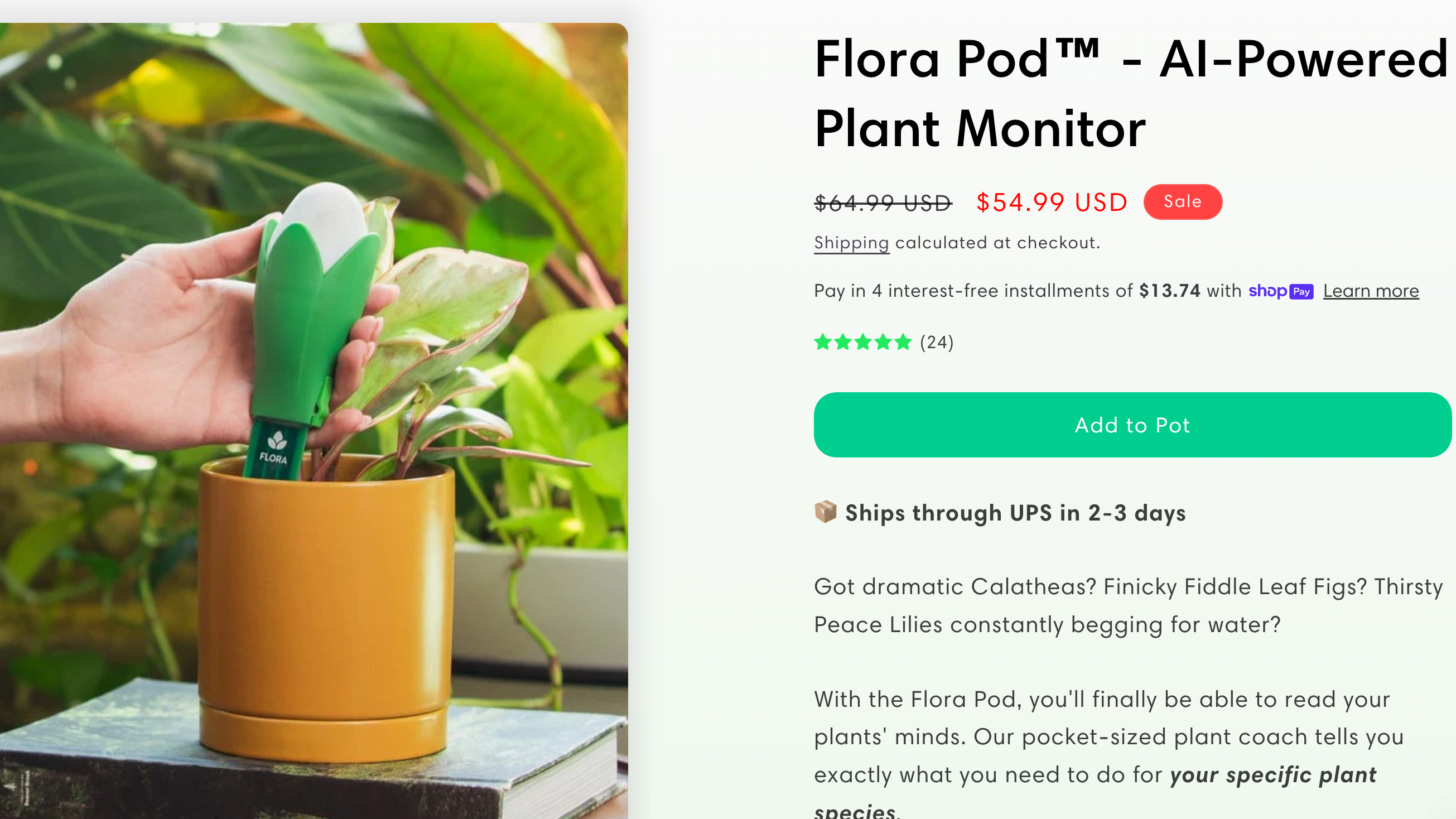
The Flora Pod Plant Sensor is for sale on their website for $54.99. This is a discounted price from the advertised $64.99.
Flora Pods Plants
There are abut 80 plants that can be purchased on Flora Plants, all priced between $20 and $50. Th goal is to offer a wide variety of plants, and also help newbies (like me) get to know the most common plants that can be used.
Here we summarized each plant with its name and the main characteristics. You can find the all on the Flora’s website.

African Milk Tree
A succulent plant that requires full sun to light shade exposures and well-drained soil. It’s known for its tall, columnar shape and milk-like sap.

Alocasia Black Velvet
Noteworthy for its dramatic, velvety black leaves. Prefers bright, filtered light and high humidity.

Alocasia Frydek
Recognizable for its large, arrowhead leaves and distinctive veining. Prefers bright, filtered light and high humidity.

Alocasia Grey Dragon
This plant features silver-grey leaves with darker veins and prefers bright, indirect light.

Alocasia Polly
Known for its striking dark, arrow-shaped leaves with vibrant white veins. It prefers bright indirect light and a high humidity environment.

Alocasia Regal Shields
Giant, shield-shaped leaves characterize this plant. It requires bright indirect light and prefers high humidity.

Aloe Vera
A popular succulent with healing properties, it prefers well-drained sandy soil and bright, indirect sunlight.

Anthurium Fingers
This Anthurium variety has unusual finger-like flowers and prefers the same conditions – indirect light and high humidity.

Anthurium Pink Flamingo
Similar to its red counterpart, but with pink blooms instead. It prefers the same growth conditions – indirect light and high humidity.

Anthurium Red Flamingo
Known for its vivid red, heart-shaped blooms, this plant does best in indirect light and high humidity.

Baby Rubber Plant
Characterized by its thick, glossy leaves. Prefers bright indirect light, and likes soil that is well-draining.

Bicolor Dragon Tree
Tall, tree-like plant that prefers moderate light and has relatively low water needs.

Bird’s Nest Fern
This fern prefers indirect light, high humidity, and consistently moist soil.

Blue Star Fern
Ths plant prefers low to medium light. Keep the soil consistently moist but not waterlogged.

Boston Fern
It is a popular houseplant which requires high humidity, good air circulation and filtered light to grow best.

Braided Money Tree
A popular houseplant recognized for its thick, braided trunk and lush, green leaves. It prefers bright, indirect light and regular watering.

Calathea Dottie
This plant prefers low to medium light and needs to be watered regularly. It’s known for its deep purple leaves that seem to shimmer.

Calathea Pinstripe
Known for its unique striped leaves. It prefers medium to low light conditions and soil that is consistently moist.

Calathea Rattlesnake
Recognized by its striking, green spotted leaves. It prefers low to medium light and needs to be kept moist without being waterlogged.

Chinese Money Plant
Known for its round, coin-like leaves. It thrives in bright, indirect light and prefers to be kept in well-draining soil.

Croton Gold Dust
Similar to the Petra, but with leaves sprinkled with bright gold spots. Same lighting and watering needs apply.

Croton Petra
A vividly colourful plant that prefers bright light and humid conditions. Ensure it’s watered regularly.

Dracaena Song of India
Known for its yellow-striped leaves, it can tolerate a variety of lighting conditions but requires well-drained soil.

Dwarf Umbrella Tree
This miniature version of its larger counterpart prefers bright, indirect light and moderate watering.

False Shamrock
A plant with deep purple, triangle-shaped leaves. It enjoys bright light and well-draining soil.

Ficus Ginseng
An attractive bonsai plant known for its bulbous roots and glossy leaves. Requires bright light and regular watering.

Ficus Tineke
A variant of the rubber plant with creamy, variegated leaves. It enjoys bright, indirect light and rich, well-draining soil.

Fiddle Leaf Fig
Known for its large, glossy foliage, it enjoys bright, indirect sunlight and prefers dry conditions than too wet.

Fishbone Cactus
This cactus has a distinctive ‘zig-zag’ pattern in its foliage and prefers bright, indirect light.

Golden Pothos
Known for its trailing, variegated leaves, it thrives in a wide variety of lighting conditions and is easy to care for.

Heartleaf Fern
As the name suggests, its leaves are heart-shaped. It prefers bright indirect sunlight and moist soils.

Hoya Krimson Queen
A tropical plant valued for its thick, tricolor variegated leaves. Recognized for being hardy, it thrives in well-draining soil rich in organic matter like coco coir. Regular watering with a preference for drier soil reflects its epiphytic nature. Bright, indirect light yields the best growth.

Hoya Macrophylla
A vine plant with large leaves, it prefers bright indirect light and high atmospheric humidity.

Hoya Silver Splash
Known for its unique silver-speckled leaves, this plant prefers bright, indirect sunlight and well-draining soil.

Jade Plant
A popular succulent with fleshy, round leaves. It needs well-drained soil and prefers a sunny location.

Jewel Orchid Discolor
An orchid variety appreciated for its velvety leaves with stunning vein patterns. Prefers lower light levels and high humidity.

Maidenhair Fern
Known for its delicate, feathery leaves, this fern thrives in a humid environment and requires plenty of indirect light and regular watering.

Mini Monstera
Despite its name, it is not a true Monstera. Requires similar care to the Monstera Swiss Cheese – bright, indirect light and weekly watering.

Monstera Swiss Cheese Plant
Noted for its characteristic fenestrated leaves, this plant is a great addition to homes. It enjoys indirect bright light and requires regular watering.

Moonshine Snake Plant
Recognized by its upright, silver-green leaves. Low light and infrequent water make it a popular choice.

Neon Pothos
A variety of pothos with bright, neon-green leaves. Easy to care for, and can tolerate low light.

Orbit Peacock Plant
Similar to the Peacock Plant with its vibrant foliage. Requires the same maintenance.

Parlor Palm
One of the most popular house plants, it thrives in low light and moderate watering.

Peace Lily
A low-maintenance plant that thrives in low to medium light and requires moderate watering.

Peacock Plant
Known for its beautiful, peacock-patterned leaves. Prefers medium to bright indirect light and high humidity.

Pencil Cactus
A succulent species that requires bright light and well-drained soil. Requires minimal watering in winter.

Peperomia Hope
A trailing plant with round, succulent leaves. It prefers bright, indirect light and requires a well-draining soil mix.

Philodendron Brazil
Known for its broad, variegated leaves. Prefer bright, indirect light and regular watering.

Philodendron Little Hope
This plant has dense, bushy growth and glossy green leaves. It prefers medium, indirect light and well-drained soil.

Pink Arrowhead Plant
Known for its arrowhead-shaped leaves that can range from green to a deep, rosy pink, it prefers indirect light and a humid environment.

Pothos Jade
Similar to its marble cousin but with solid green leaves, it enjoys indirect light and needs moderate watering.

Pothos Marble Queen
An easy-to-grow plant with beautiful, variegated foliage, it tolerates various lighting conditions but prefers indirect light.

Pothos Pearls and Jade
An attractive variety of Pothos with a unique pattern of white and green on its leaves. This plant does best in bright, indirect light and prefers a well-draining soil mix.

Prayer Plant Beauty Kim
Striking for its green foliage with dark green patterns, it thrives in well-draining soil and prefers indirect light.

Purple Passion Plant
Known for its fuzzy, purplish leaves. It likes bright, indirect light and requires well-draining soil.

Rabbit Foot Fern
Named for its furry rhizomes which resemble a rabbit’s foot, it prefers medium to bright, indirect light, and consistently moist soil.

Red Chinese Evergreen
An attractive plant known for glossy green and red leaves. It does well in low light, moderate watering, and does not require high humidity.

Red Prayer Plant
A beautiful houseplant that folds its leaves at night, as if in prayer. Prefers bright, indirect sunlight and consistently moist soil.

Rubber Tree Burgundy
This plant features dark burgundy leaves and prefers bright, indirect light, with soil that drains well.

Scindapsus Silvery Ann
A hardy plant with silver variegated leaves that prefers bright, indirect sunlight and regular watering.

Shingle Plant
A unique, climbing plant with leaves that lie flat against their support. Prefers bright, filtered light and moist soil.

Silver Lace Fern
Known for its delicate, lacey fronds. It prefers medium to bright indirect light and soil that’s consistently moist.

Silver Pothos Exotica
A variegated plant with heart-shaped leaves. Loves bright, indirect light and needs moderate watering.

Snake Plant Laurentii
A striking plant with vertically growing leaves. It’s known for its low light and water requirements.

Snake Plant Zeylanica
The Zeylanica variety of the Snake Plant features tall, green, mottled leaves and prefers a variety of lighting conditions. It is drought-tolerant and prefers well-draining soil.

Spider Plant
An easy-to-care-for houseplant known for its unique, spider-like babies. Likes indirect light and well-draining soil but can tolerate a wide range of conditions.

Spider Plant Bonnie
Similar to the traditional Spider Plant but with curly leaves. Has the same care preferences of indirect light and well-draining soil.

Staghorn Fern
A unique fern that prefers bright, indirect light and humid conditions. It’s often mounted, rather than potted, to mimic its natural growth style.

String of Hearts
As the name suggests, this plant is characterized by its trailing string of heart-shaped leaves. Prefers bright, indirect light, and well-drained soil.

String of Pearls
Known for its cascading vines of spherical leaves, this succulent prefers bright light and well-drained soil.

Stromanthe Triostar
Identified by its striking leaves, colored pink, cream, and green, it prefers indirect light and humid environment.

Sweetheart Philodendron
Named for its heart-shaped leaves, this plant enjoys dappled sunlight and consistently moist soil.

Swiss Cheese Vine
Its name comes from the large holes in its leaves. It prefers indirect light and humid conditions.

Tradescantia Nanouk
Recognized by its distinct, tricolored pink, white, and green leaves. Enjoys a warm environment with bright, indirect sunlight and moist soil.

Variegated Croton
A Croton variety known for its colorful, variegated leaves, it loves plenty of bright, indirect light and moderate watering.

Variegated Peace Lily
A Peace Lily variant that offers green and white variegated leaves, preferring well-draining soil and bright, indirect light.

Velvet Leaf Philodendron
This Philodendron variety features velvety leaves and prefers bright, indirect light and consistent moisture.

Watermelon Peperomia
Known for its patterned leaves, resembling the rind of a Watermelon, prefers indirect light, and well drained soil.

White Arrowhead Plant
Sporting white variegated leaves, it mirrors the growth conditions of its pink arrowhead counterpart – indirect light and a humid environment.

White Bird of Paradise
This plant is known for its large, elegant leaves and prefers bright, indirect light and well-draining soil.

ZZ Plant
An easy-care plant with glossy, green leaves. Known for its ability to tolerate low light and infrequent watering.
The Flora Pod Plant Business Model
The Flora Pod business model strategically focuses on the sale of its smart plant monitors while utilizing proprietary technology to drive plant sales on its website.
Plant Sales on Flora Pod Website
The Flora Pod website functions as a retail platform for plant sales, integrating their patent-`pending technology to foster a unique purchasing experience. Customers select plants that align with the recommendations provided by the Flora Pod Sensor, that can fit their specific environment and plant care needs and skills.
Up sale of Accessories for the Flora Pod
Another stream of revenue comes from the upsale of non-pod products. For example, if you are on the Flora Pod page, there is a suggestion for the Hydra Automatic 300mL Water Mister, and the Bio-Organic Plant Food.
Customer Reviews
The Flora Pod Plant Sensor has received feedback from a variety of users, ranging from individuals struggling with plant care to those seeking to refine their green-thumb skills. This section breaks down what users and experts alike have to say about their experiences with the Flora Pod.
User Testimonials
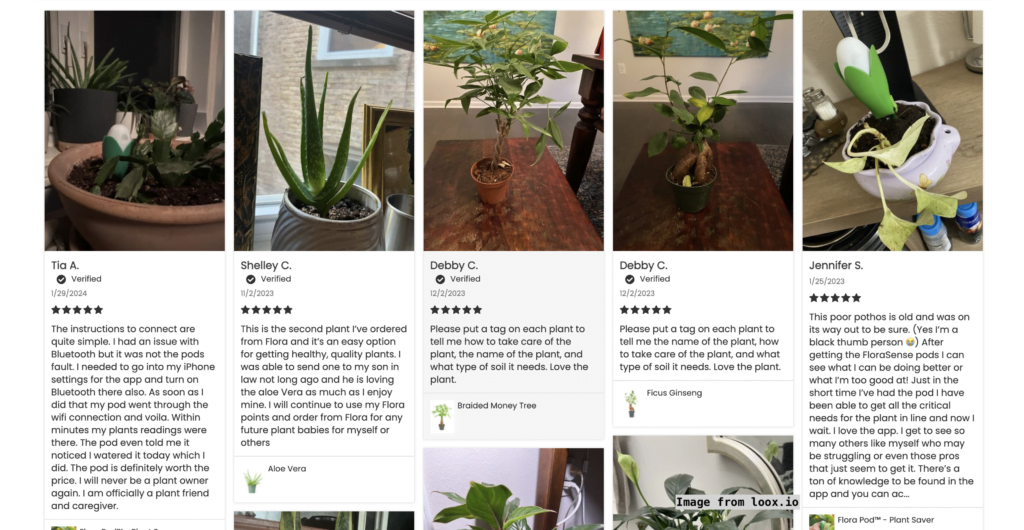
Jennifer S. (1/25/2023): She remarks on the noticeable improvement in her plant’s health since using the Flora Pod. With the device’s guidance, she’s been able to address her plant’s critical needs and eagerly anticipates further results. Read more about Jennifer’s experience.
Trisan S.: Thrilled with the app’s performance, they find it ideal for plant caregivers at all levels, highlighting the app’s capability to demystify plant care. Discover Trisan’s review.Expert Opinions
Gadget Flow: They describe the Flora Pod as a “smart plant sensor” that offers helpful recommendations, potentially saving one’s plants with its “magical patent-pending” technology. Learn about expert insights.
Smart Home Scene: Evaluates the Xiaomi MiFlora Plant Sensor, emphasizing its seamless integration with Home Assistant and its convenient Bluetooth capabilities that enable real-time tracking of plants’ conditions. Examine the expert review.







